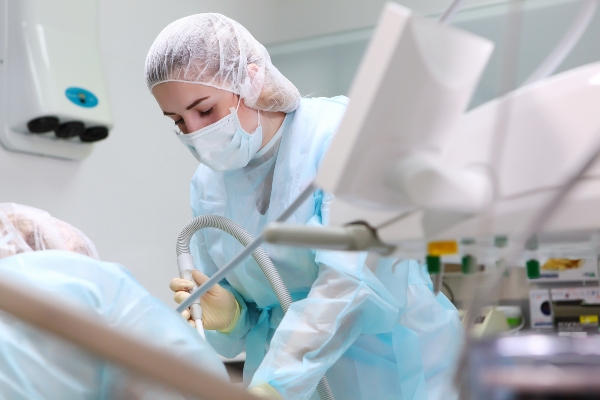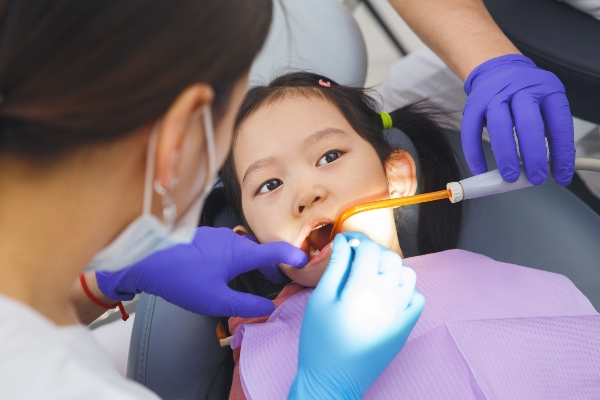A Pediatric Dentist Discusses Primary and Permanent Teeth

Looking for information on your child's teeth? Read on for details from a pediatric dentist on primary and permanent teeth. Primary (baby) teeth serve an important role in child development, and the health of baby teeth can impact the health and growth of permanent teeth.
What parents should know about primary and permanent teeth
Primary teeth are the first set of teeth that come through as a toddler, and permanent teeth come in once the primary teeth fall out (usually around the age of six or seven). The following is a basic guide to primary and permanent teeth to help parents care for their child’s pearly whites.
What are primary teeth?
Primary teeth, also called baby teeth, are the first set of teeth that emerge through the gums at a young age. They are smaller than permanent teeth and fit the smaller jaws of children. They serve an important role in paving the way for adult permanent teeth to emerge once the jaw grows.
At what age do primary teeth emerge?
Primary teeth come through around six months of age. Pediatric dentists recommend having your child visit the dentist for the first time once (or right before) primary teeth come through. This provides an opportunity for the dentist to check on the development of the teeth and detect any issues before they linger or worsen.
What are permanent teeth?
Permanent teeth are the second and final set of teeth that come through the gums after primary teeth. As mentioned, permanent teeth come through the gums starting around the age of six or seven, and most children have their full set of permanent teeth by the age of 13 (excluding third molars). Permanent teeth are larger and stronger than primary teeth, and they are important to protect as they must be replaced with artificial teeth if they become lost due to poor oral hygiene or dental trauma.
Is it important to protect primary teeth?
It is important to protect primary teeth as oral health issues and the loss of primary teeth can impact the development of permanent teeth. One of the purposes of primary teeth is to hold the place of permanent ones, and they serve as a guide for permanent teeth. If baby teeth fall out prematurely, then it can increase the risk of teeth and jaw alignment concerns, leading to an increased need for orthodontic care.
How can I care for my child’s primary teeth?
Parents can care for their child’s primary teeth by ensuring they are brushed several times a day and flossing them, teaching the child proper oral care techniques while assisting them. It can also help to limit the consumption of beverages and foods that are high in sugar and other carbohydrates.
A condition known as baby bottle tooth decay is relatively common in toddlers that commonly consume sugar-filled drinks from a baby bottle. This notably includes natural sugars that are found in many fruit juices. Of course, it is always best to discuss an oral care strategy for your child with a pediatric dentist.
How often are visits with a pediatric dentist recommended?
Pediatric dentists recommend bringing children in every four to six months for a check-up visit. This gives the dentist an opportunity to check on the child’s tooth development and detect any potential oral health concerns as early as possible. The ultimate goal is to avoid the need for any invasive and expensive procedures throughout the child’s primary tooth development.
What do I do if my child’s tooth falls out or develops dark spots?
It is important to determine the cause of the tooth falling out. Of course, primary teeth will inevitably come out at some point, and the natural loss of a primary tooth is not a cause for any concern. However, if a primary tooth comes out prematurely or develops concerns such as dark spots due to dental trauma or a dental cavity or tooth infection, then it is important to notify your child’s pediatric dentist right away to determine the appropriate steps to take.
Ready to schedule a check-up and cleaning visit for your child?
If your child has not yet been to the dentist or it has been more than six months since their last visit, then contact our kid-friendly pediatric dentistry office today to schedule a visit. Here at our practice, we take genuine pride in helping parents protect their child’s primary and permanent teeth.
Request an appointment here: https://www.hvkidsmiles.com or call Hudson Valley Pediatric Dentistry at (845) 363-4177 for an appointment in our Middletown office.
Check out what others are saying about our dental services on Yelp: Pediatric Dentist in Middletown, NY.
Recent Posts
A child dentist can help your child achieve better dental and general health. Regular visits allow your child to get used to dental checks, tools, and equipment. Dental fear disappears, and the young patient can continue having a bright, painless smile. Here are what parents like you should look forward to during child dentist appointments.Choosing…
Cavity treatment for kids is essential for a child’s oral health. Dental decay can cause discomfort, causing the child to lose focus at school. It can even result in low self-esteem and malnutrition. Treating cavities can improve your child’s general health. Here are effective techniques for cavity treatment for kids.There are cases when fillings cannot…
Parents play a crucial role in their children's tooth care by ensuring their children get started on the right path to optimal dental health. This involves overseeing children's tooth care at home while also helping them develop healthy dental habits and ensuring they see a pediatric dentist regularly.Parents will need to keep their child's mouth…
Just like adults, children need preventive dental care — that is where pediatric dentistry comes in. Many parents believe that their child's teeth are healthy simply because their child is young. The truth is that oral health issues are as prevalent in kids as much as adults. Since they love sugary treats, the risk of…


